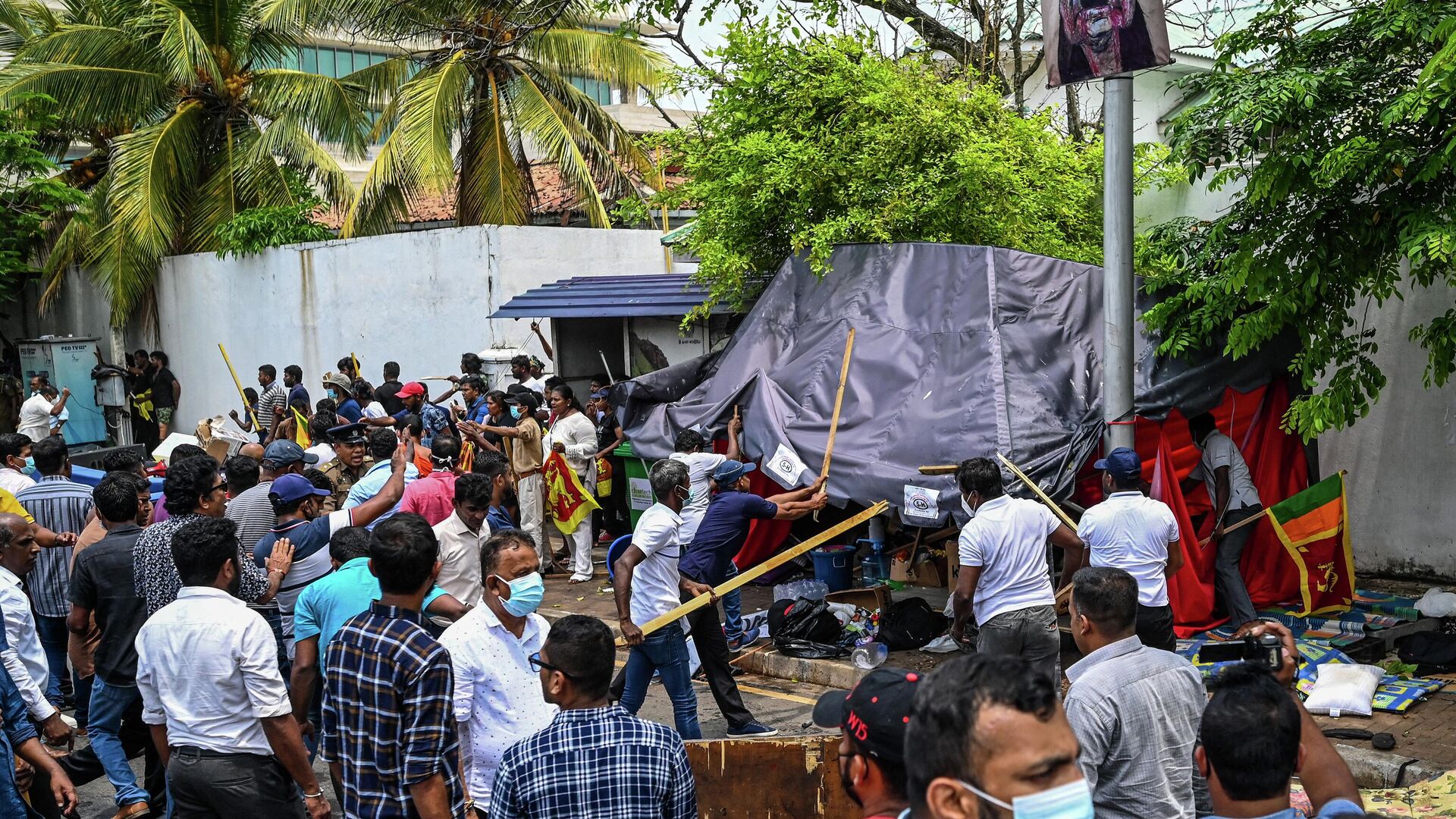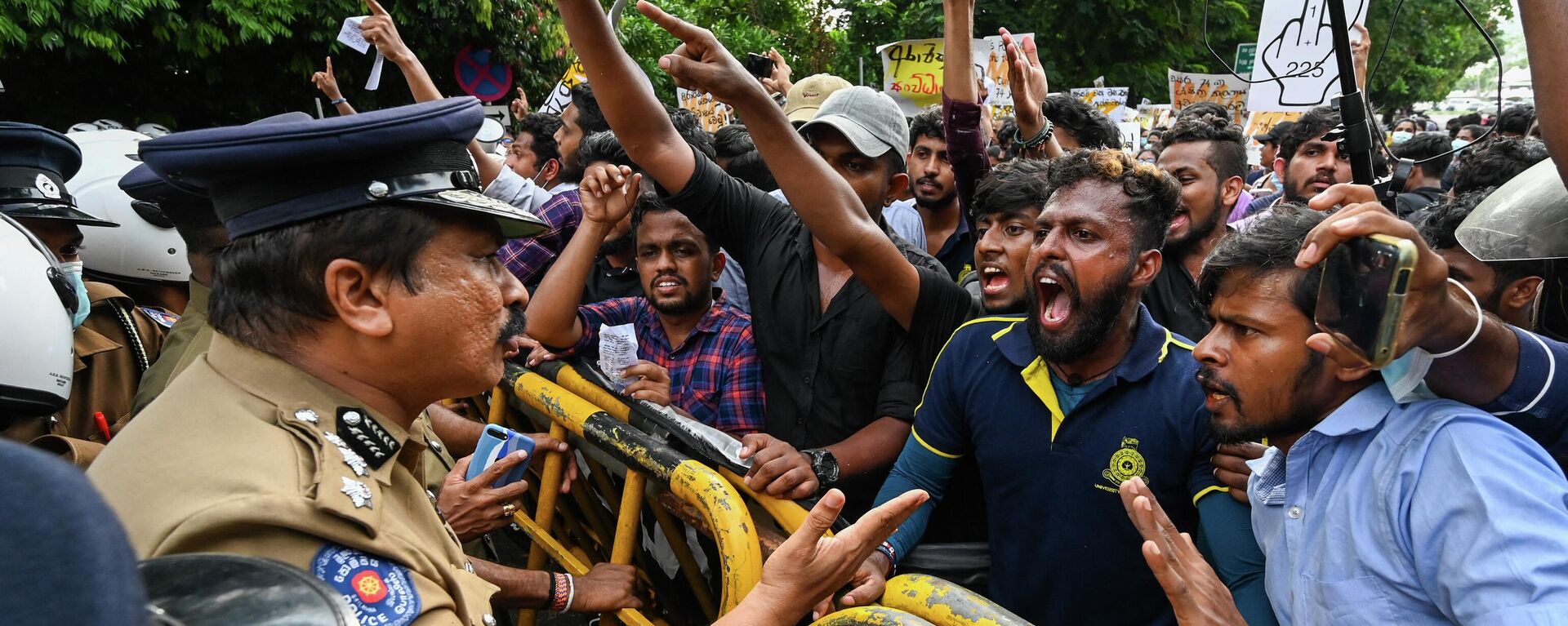https://sputnikglobe.com/20220509/sri-lankas-prime-minister-reportedly-resigns-1095363385.html
Sri Lanka's Prime Minister Resigns Amid Anti-Government Protests
Sri Lanka's Prime Minister Resigns Amid Anti-Government Protests
Sputnik International
Sri Lanka has been rocked by mass protests for weeks, with people outraged over the government's policies amid the country's worst economic crisis in decades. 09.05.2022, Sputnik International
2022-05-09T10:24+0000
2022-05-09T10:24+0000
2022-05-09T11:40+0000
sri lanka
mahinda rajapaksa
resignation
mass protests
https://cdn1.img.sputnikglobe.com/img/07e6/05/09/1095364441_0:160:3073:1888_1920x0_80_0_0_8e2e25deccdd3b3cfe9ebdec5e729872.jpg
Sri Lanka's Prime Minister Mahinda Rajapaksa has resigned, his spokesman Rohan Weliwita said.The 76-year-old prime minister sent his letter of resignation to his younger brother, President Gotabaya Rajapaksa, clearing the way for a "new unity government", the spokesman said, quoted by AFP.Earlier, news about the prime minister's resignation was broken by local media. On Monday, the government imposed a nationwide curfew and deployed the army in the capital Colombo amid violent clashes between anti-government protesters and government supporters outside President Gotabaya Rajapaksa's office. Dozens of people were injured in the clashes. Police used tear gas and water cannons to disperse the protesters. Sri Lankans have been facing the worst economic crisis since gaining independence from British rule in 1948. People have been suffering amid acute shortages of food, fuel, and medicines, as well as months of power outages. The crisis broke out after Sri Lanka lost the vital income it had traditionally received from tourism and remittances. This happened due to the coronavirus pandemic and tough COVID-related restrictions that affected the entire region. As a result of this, Sri Lanka was no longer able to pay off its $51 billion foreign debt and banned the import of some goods.
https://sputnikglobe.com/20220505/indias-tamil-nadu-dmk-lawmakers-donate-wages-to-crisis-hit-sri-lanka-1095287245.html
sri lanka
Sputnik International
feedback@sputniknews.com
+74956456601
MIA „Rossiya Segodnya“
2022
News
en_EN
Sputnik International
feedback@sputniknews.com
+74956456601
MIA „Rossiya Segodnya“
Sputnik International
feedback@sputniknews.com
+74956456601
MIA „Rossiya Segodnya“
sri lanka, mahinda rajapaksa, resignation, mass protests
sri lanka, mahinda rajapaksa, resignation, mass protests
Sri Lanka's Prime Minister Resigns Amid Anti-Government Protests
10:24 GMT 09.05.2022 (Updated: 11:40 GMT 09.05.2022) Sri Lanka has been rocked by mass protests for weeks, with people outraged over the government's policies amid the country's worst economic crisis in decades.
Sri Lanka's Prime Minister Mahinda Rajapaksa has resigned, his spokesman Rohan Weliwita said.
The 76-year-old prime minister sent his letter of resignation to his younger brother, President Gotabaya Rajapaksa, clearing the way for a "new unity government", the spokesman said, quoted by AFP.
Earlier, news about the prime minister's resignation was broken by local media.
On Monday, the government imposed a nationwide curfew and deployed the army in the capital Colombo amid violent clashes between anti-government protesters and government supporters outside President Gotabaya Rajapaksa's office. Dozens of people were injured in the clashes. Police used tear gas and water cannons to disperse the protesters.
Sri Lankans have been facing the
worst economic crisis since gaining independence from British rule in 1948. People have been suffering amid acute shortages of food, fuel, and medicines, as well as months of power outages. The crisis broke out after Sri Lanka lost the vital income it had traditionally received from tourism and remittances. This happened due to the coronavirus pandemic and tough COVID-related restrictions that affected the entire region. As a result of this, Sri Lanka was no longer able to pay off its $51 billion foreign debt and banned the import of some goods.


